Learn
Reuse 101
Everything you need to know to make the case for reuse in your community, at your workplace, and beyond.
What is a reuse economy?
In a reuse economy, products and packaging are designed from the beginning for reusability – to be recirculated in the form in which they were originally created and intended, and they are put into a system in which they can be used again and again.
What does a reuse system look like?
A reuse system is made up of the infrastructure, logistics, and technology for collection, washing and processing, and recirculation of durable, returnable products and packaging. Reuse service providers who offer some or all of these elements are part of a burgeoning industry.
Upstream’s primary goal is to achieve widespread, interoperable reuse infrastructure that makes the reuse economy possible. We do this by normalizing reuse, growing and supporting the reuse industry, and ensuring a supportive policy environment.
Why do we need a reuse economy?
The reuse economy suppresses extraction of materials and the endless production of single-use items. It all but eliminates landfilling and incineration. It keeps resources circulating locally and helps businesses achieve independence from volatile global supply chains. Reuse slows global climate change and builds climate resilience for communities that are already facing climate impacts. It creates jobs, increases community wealth, and it represents a just transition to a safe, healthy, participatory new industry.
According to the Ellen MacArthur Foundation, converting just 20% of single-use plastic packaging to reusable is a business opportunity worth $10 billion. New jobs, new businesses, new systems to bring our communities into the 21st Century: reuse is an economic driver for the country.
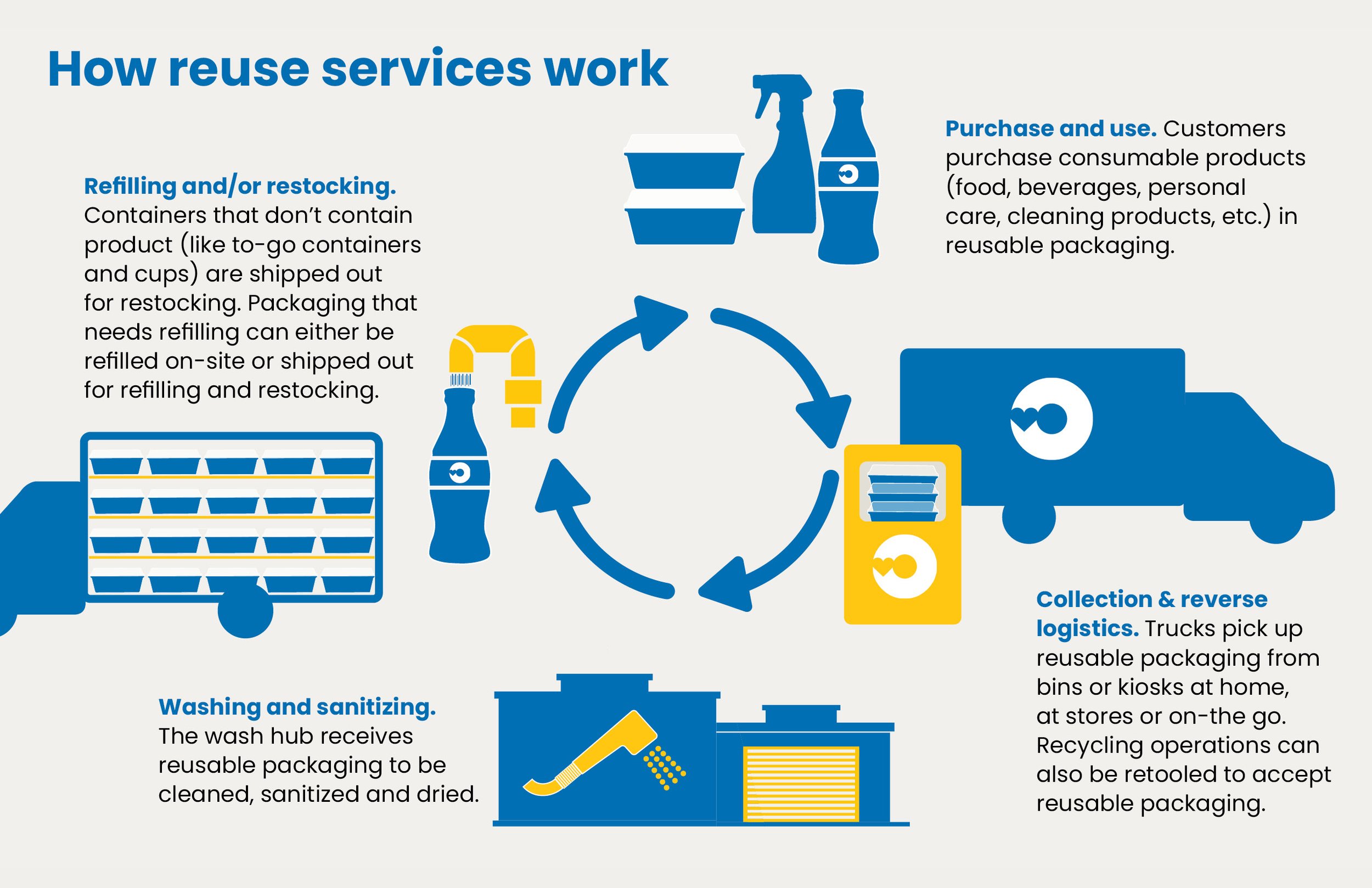
Reuse Learning Toolkits
Informational overviews of topics to help you learn the ins and outs of reuse, with a rich library of resources at the bottom of each page for a deeper dive into the topic.
-
![hands passing food at a restaurant with reusable dishes]()
Reuse for Onsite Dining Library
-
![A plastic bag with the words 'BIO COMPOSTABLE' containing several apples, which are also visible outside the bag.]()
Why single-use compostables and bioplastics aren’t the answer
-
![A person wearing a reflective safety vest standing near large bales of compressed trash and plastic waste outdoors, with a gray industrial building and trees in the background under a cloudy sky.]()
Why we can’t recycle our way out of the problem
-
![Close-up of green tropical leaves, including monstera and fern, layered and overlapping.]()
Reuse vs. single-use: environment
-
![A glass container filled with coins in which a small green plant with leaves is growing.]()
Reuse vs. single-use: economics
-
![Hand holding a reusable coffee cup with a black lid outdoors, with bicycles and fallen yellow leaves in the background.]()
The new reuse economy
-
![A bicycle parked on a bike rack near a green grassy area and a large brick building with ivy-covered walls. Trees line a sidewalk in a park-like setting on a sunny day.]()
Reuse in Schools
-
![A stainless steel tumbler filled with a latte topped with latte art sitting on a wooden table, with a large textured white vase filled with purple and green floral arrangements in the background.]()
The Reuse Outreach Playbook
Reuse Reports by Upstream
For other key reports regarding reuse, see our Research page.
-
![Colorful stacked plates and bowls with spoons on a white background.]()
Reuse Wins
-
![A crowd at a concert or festival with people making heart shapes with their hands, facing a brightly lit stage with smoke effects.]()
Reuse Wins at Events
-
![Arrangement of various food and household product containers, including seasoning jars, tea tins, and bottles of tea and detergent.]()
The New Reuse Economy
-
![kid with lunch tray]()
The Conscious Cafeteria Report
Reuse 101 Articles
To achieve systems-level change, how do we focus on what needs to be unlocked in order to facilitate a shift to a reuse economy?
Upstream’s first appearance at this conference geared toward waste management professionals and government staff.
Upstream's Cerise Bridges offers her “notes from the field” after attending a conference about Chicago’s new sustainability law.
How to effectively use LCAs as a tool to leverage and scale reuse systems.
To make a strong case for reuse and to build optimal systems, we need to use a systems approach in our LCAs.
We did not “ask” for our packaging to be disposable. Why should companies wait for consumers to “ask” for reusable products and packaging?
How do you get customers to return to a system of reusable containers when they have been trained for years to throw them away when they are finished? Reuse businesses around the world are trying to answer this question.
At its root, the reuse movement is a social and environmental justice movement.
Upstream's Macy Zander introduces new solutioneers to what they can do to help the single-use waste crisis, today.
Conversation about the climate crisis tends to center on vehicles and the power grid. But the one-way throw-away economy is also a major factor. Here’s how you can help.
At the end of March, more than 100 core members from dozens of countries convened for the first global meeting of the BFFP movement since before the pandemic. Here are some key takeaways.
An everyday guide for conducting reuse outreach & education at food businesses.
There’s a lot of single-use waste that comes into our homes. But there are concrete steps we can take to reduce it.
When it comes to changing something as entrenched as the throw-away culture, the real changemakers are local community members and their elected officials – people who are passionate about saving the planet and ready to innovate new approaches.
On Wednesday, representatives from 175 nations agreed to draft a global treaty that would start to tackle the exponentially growing amount of plastic pollution that we’re facing – essentially a Paris Agreement for plastics.
After launching a few reuse coalitions ourselves (and supporting others to do the same), we offer the following best practices to help you think about what might work best in your community.
Reuse Wins, a new report from Upstream, shows how a new reuse economy is emerging to replace the use of single-use products in food service. The key findings in the report draw from life-cycle studies that compare the environmental impacts of disposables versus reusables, and project the potential cost savings to business and local government from transitioning to a new reuse economy.
The pressure to save the world amidst the evolving climate crisis gets bigger by the minute, and it can be daunting and disheartening. In light of Mental Health Awareness Month, this brought me to a question that anyone facing such heavy circumstances, at any moment, needs to know the answer to: How can I practice mental self care when I start to feel small and dejected?
Handy insights, tips, and talking points for approaching food service businesses to help them save money and the planet at the same time.
Because the Break Free From Plastic Act does not currently focus on reusables, we organized a working group to develop recommendations for building reusable/refillable requirements into the Act and have been communicating these ideas to the authors of the legislation.
As You Sow uses shareholder advocacy to press publicly-traded companies to improve their social and environmental practices and policies.
We’re excited to share an idea (and an offer) to start replacing single-use with reuse in your own home today.
We have a once-in-a-lifetime opportunity to remake the society that we return to, to #ReturnToBetter rather than #ReturnToNormal.
We CAN have a future with a strong, equitable, and just economy that reduces climate impacts and plastic pollution.
How can we co-create the future we all want to live in?
Reuse 101 Podcasts
Episode 166: Christiana Dujardin, lead analyst for the Ellen MacArthur Foundation’s groundbreaking report, Unlocking A Reuse Revolution - Scaling Returnable Packaging, shares insights & takeaways on designing a returnable packaging system that can compete across the board with single-use.
Episode 160: Inspiring Berkeley High School students Sophie Horvath and Joshua Swift-Rawal share their journey in advocating for reuse at their school and beyond.
Episode 159: Join the Green Sports Alliance, Portland Trail Blazers, and Bold Reuse to learn about winning off-the-field with reuse at stadium events.
Episode 105: If you missed our Indisposable Live panel, Envisioning the New Reuse Economy, catch the audio version of this engaging discussion here.
Episode 104: Ocean Plastics Leadership Network Founder Dave Ford walks us through the big picture ideas and strategies that are needed to bring about reuse solutions on a global scale.
EPISODE 103: Former MLB player and co-founder of Players for the Planet Chris Dickerson talks about his vision for zero-waste athletic stadiums and a cleaner planet for future generations.
EPISODE 102: Kristy Drutman, aka Browngirl Green, uses storytelling and community-building to coalesce tens of thousands of followers around environmental and climate justice solutions.
EPISODE 96: Doctor, mother, & Solutioneer Manasa Mantravadi is on a mission to replace plastic wherever families dine – creating a brighter, healthier future for kids and planet.
EPISODE 95: Journey with legendary innovator William McDonough as he describes his approach to design, sustainability, and ultimately – a model for the new reuse economy.
EPISODE 93: Join Reuse Seattle’s Stephanie Thomas & Pat Kaufman as they discuss their journey from building recycling programs to building reuse on the municipal level.
EPISODE 91: Taking a look at the effects of racism, climate change, and unchecked consumption on communities of color – with environmental justice leaders Dr. Ana Baptista and Jose Bravo.
EPISODE 90: For World Oceans Day, Oceanic Global’s Cassia Patel discusses why we all need our oceans to be healthy and plastic free.
EPISODE 87: Thinking about organizing for reuse in your own city or town? Listen in for lessons from three leaders making change in their communities.
EPISODE 85: Linking climate, reuse, and environmental justice from both policy and business perspectives, with Marcel Howard and Rich Grousset.
EPISODE 79: Lessons from the Gulf Coast frontlines: connecting climate, racial, and environmental justice to turn off the tap on disposable, single-use production.
EPISODE 77: In honor of Black History Month, Upstream’s Marcel Howard discusses the historical scars of environmental racism, the rise of the environmental justice movement – and why reuse is an important part of the solution.
EPISODE 70: Coalition leaders of Reusable LA – a Reusies 2021 award winner – talk about the power of relationships for policy wins and offer tips for local reuse organizing.
EPISODE 64: Benjamin Von Wong, an internationally recognized photographer, activist and panelist for The Reusies, explains how his projects bring attention to environmental issues and the power of campaigns, collaboration, and art activism.
EPISODE 62: Sustainable designer and living legend William McDonough shares his wisdom on how to shift our thinking, language, and actions toward a world where – as in nature – there is no such thing as waste. The special episode series for The Reusies™ National Reuse Awards continues.
EPISODE 57: Experts in reusable systems discuss how we can make a "Clean Break" from single-use plastic for the health of people, oceans and the planet.
EPISODE 56: How Break Free From Plastic brand audits around the world are holding companies accountable for plastic pollution.
EPISODE 53: Hear from the experts behind Upstream’s new report, Reuse Wins, and why switching from single-use to reuse in food service is a win for all.
EPISODE 52: An exploration of showing up for activism in ways that transform us, our relationships, and the world we’re seeking to change.
EPISODE 51: Join a thoughtful conversation with Dave Ford about how Ocean Plastic Leadership Network’s diverse group of advocates is working to end plastic pollution in oceans.
EPISODE 50: Tune in to learn about the impacts and perceptions of human consumption, and how reproductive rights promote environmental prosperity.
EPISODE 48: Field notes on Equitable Policy Organizing, with Dana Laurent of the Ballot Initiative Strategy Center.
EPISODE 45: Standing with #breakfreefromplastic this Earth Day in support of community-led actions to stop toxic plastic production across the US.
EPISODE 43: Diapers can be rough on babies, the earth, and parents’ bank accounts. EarthDiaper models a new option which is accessible to all.


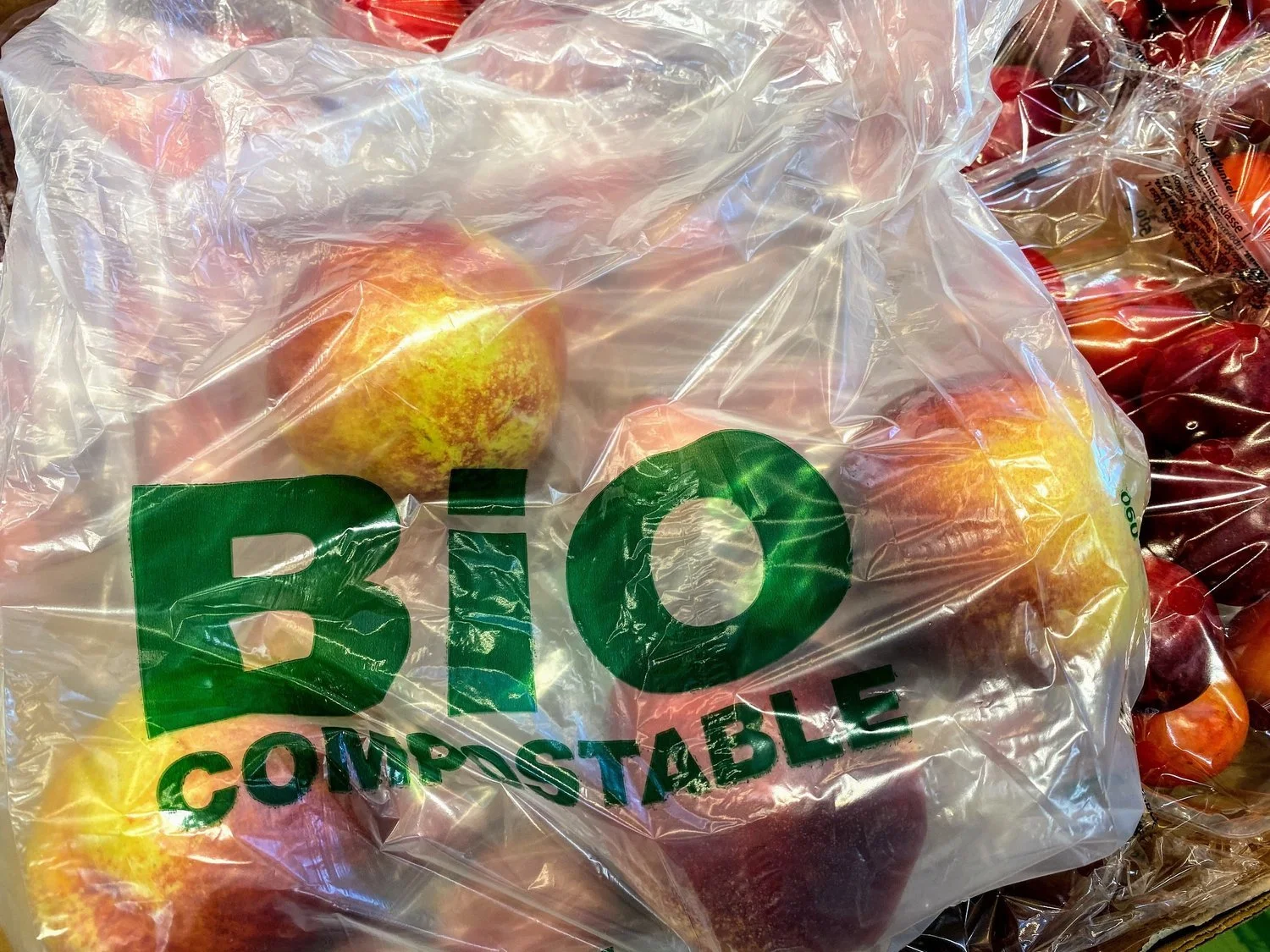


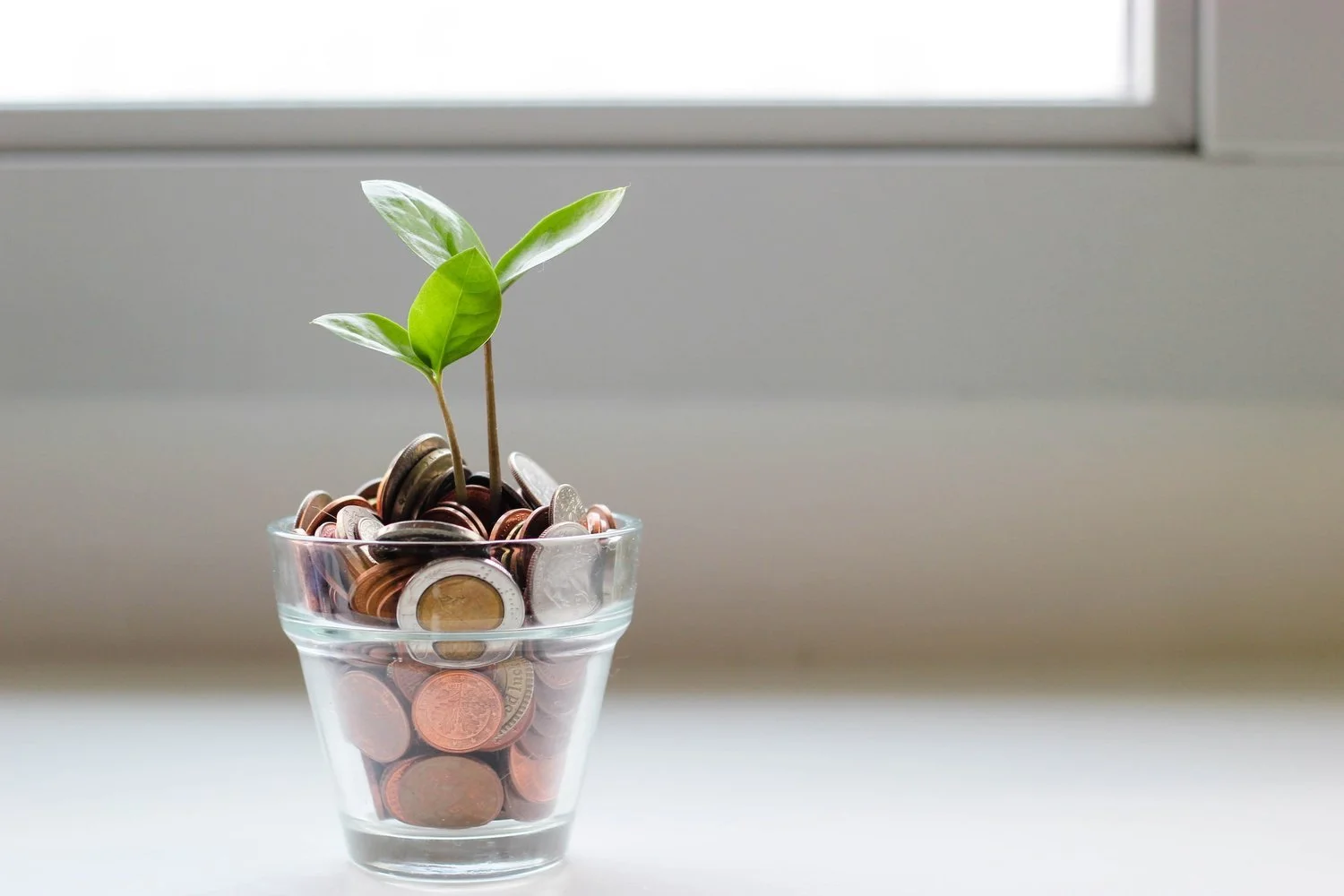
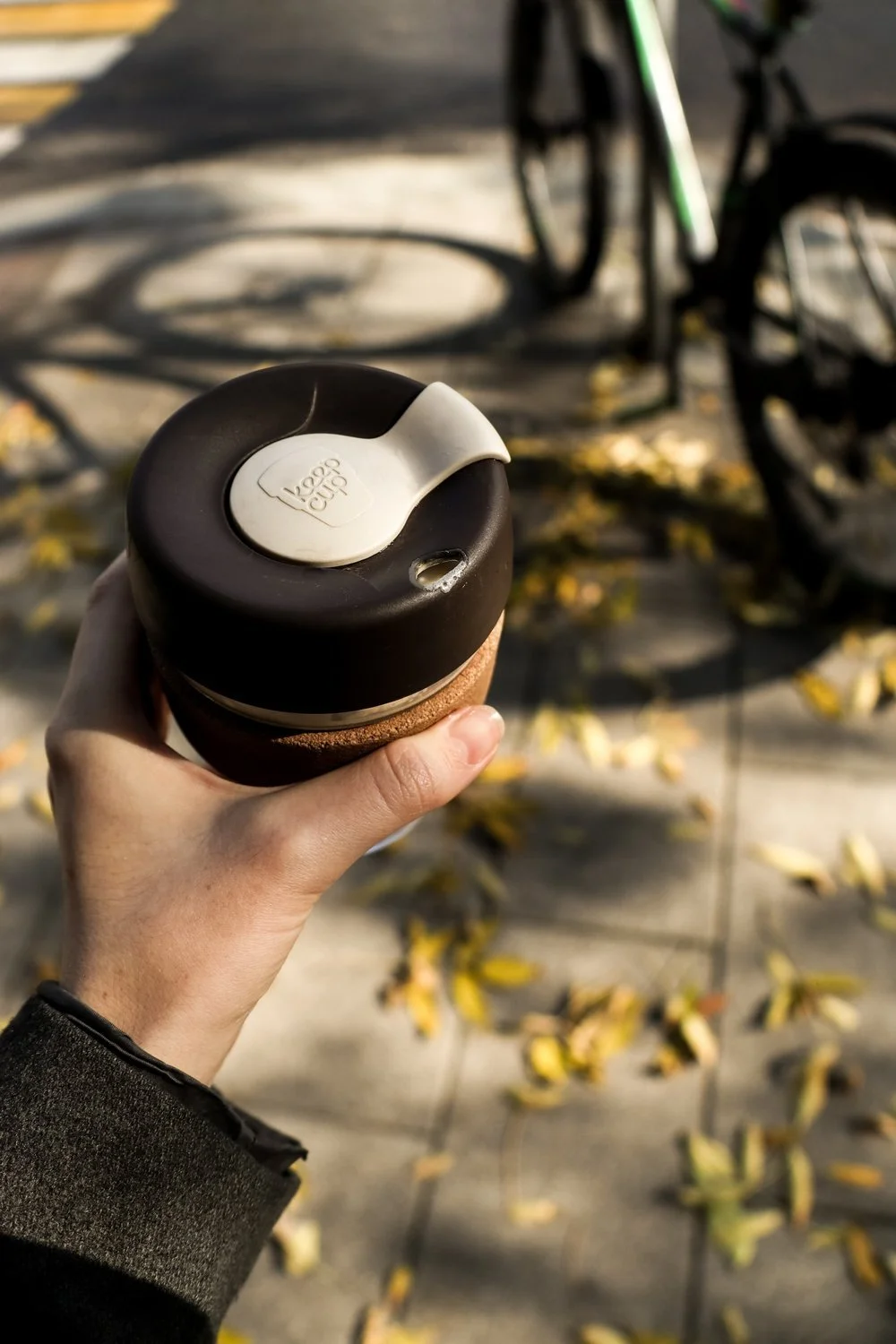
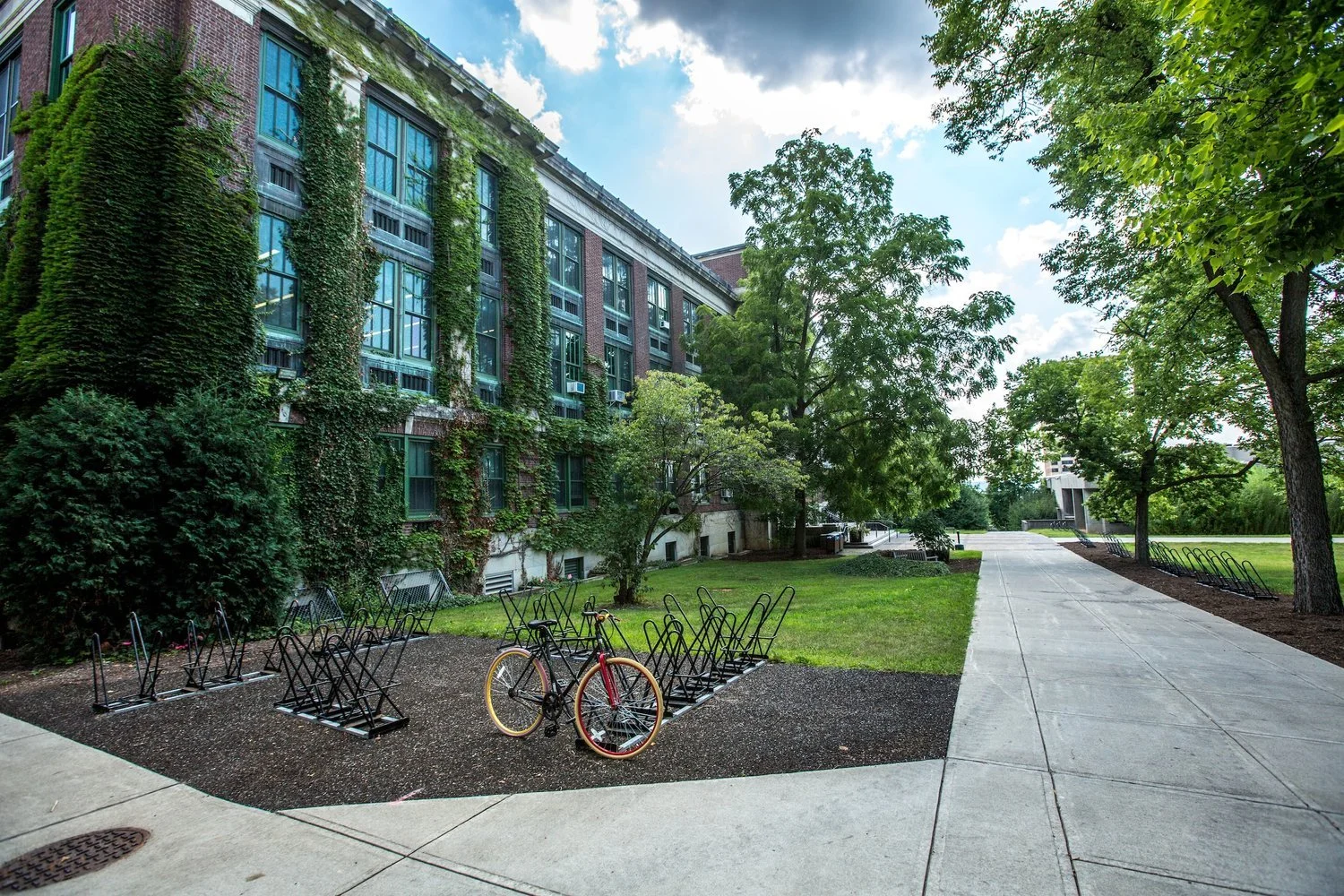






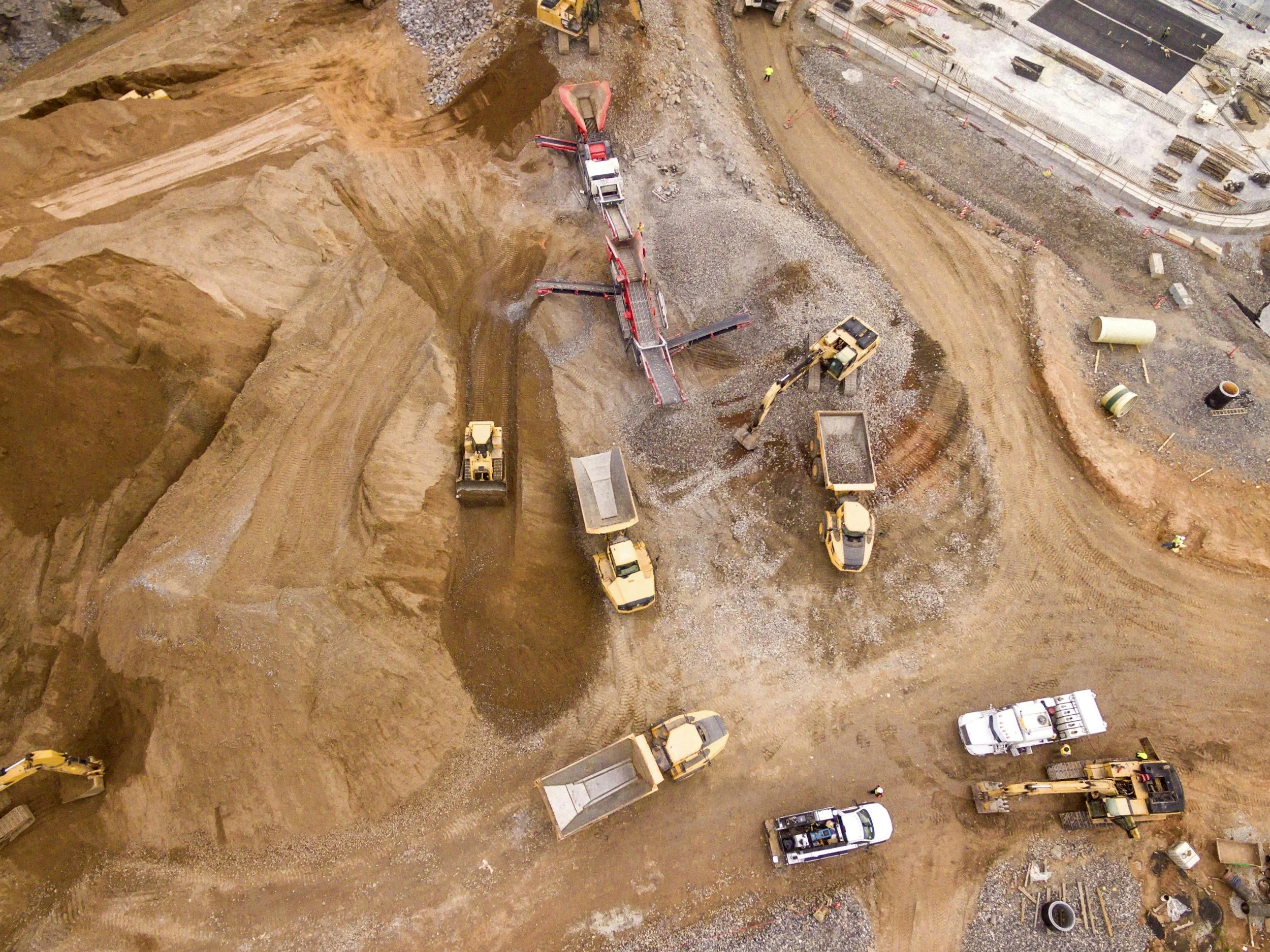



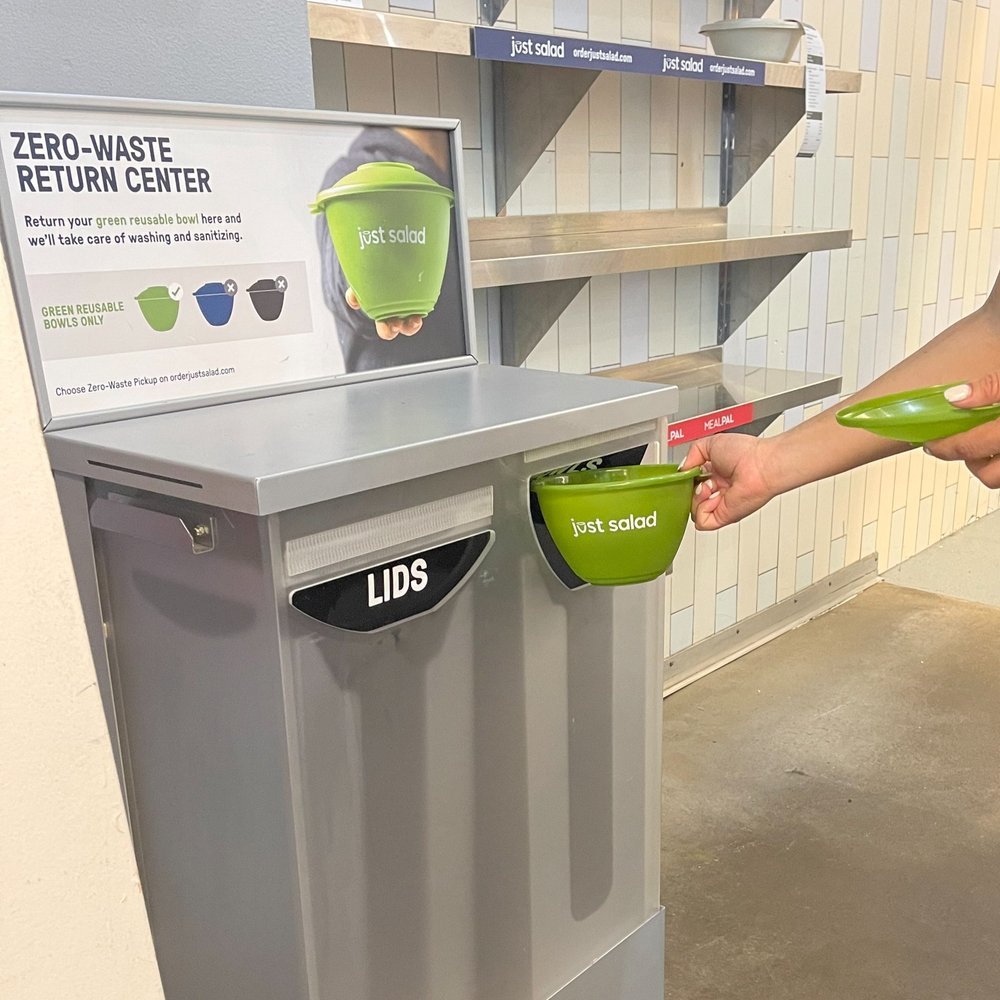




















































Recyclable and reusable packaging can share collection points, transportation systems, and sorting and processing facilities. Here’s what that looks like.